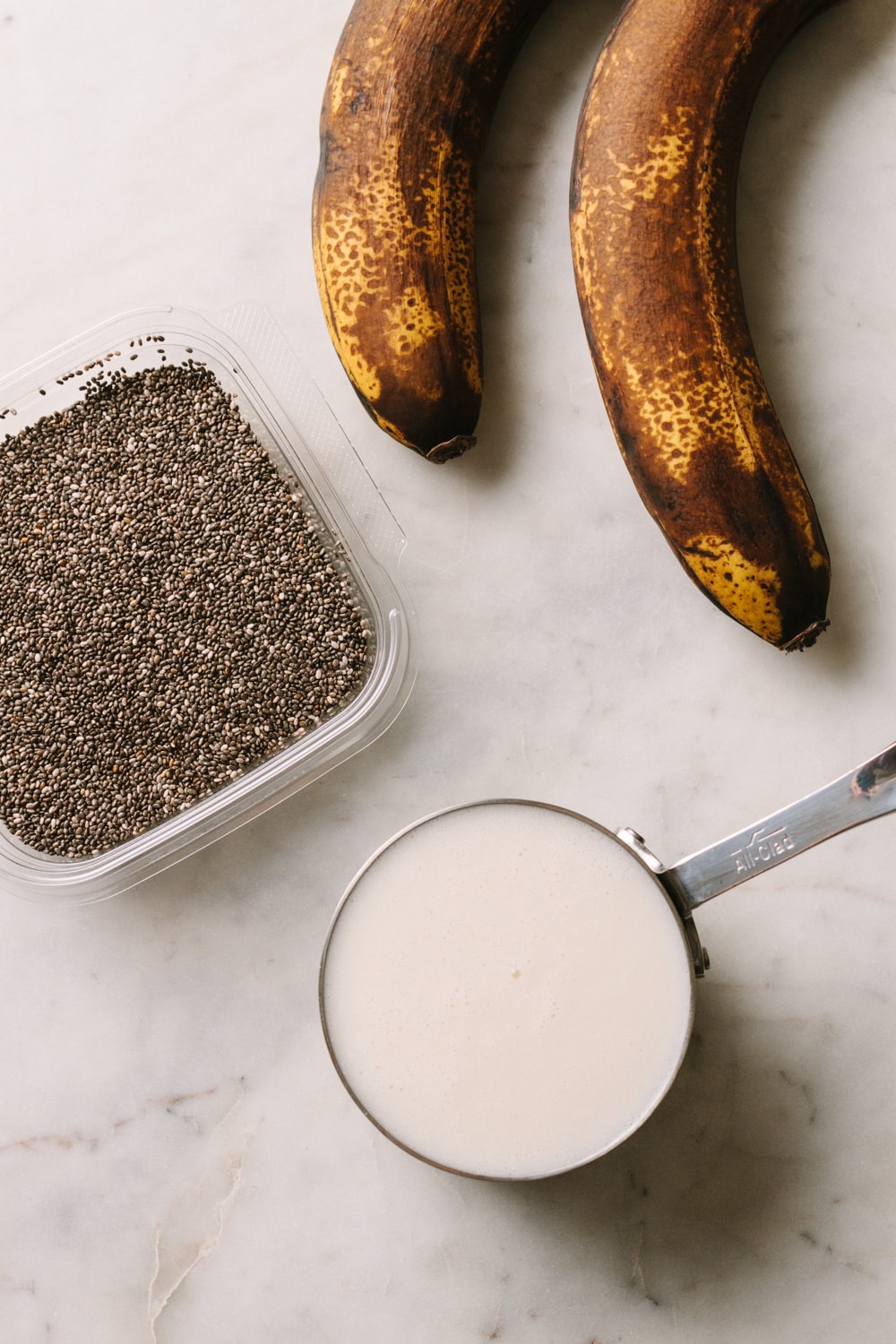Banana Chia Pudding
Banana Chia Pudding with only 3 simple ingredients can be served for breakfast, dessert, or snack. Thick and creamy, it’s healthy, easy to make, and delicious as can be!

You may already be familiar with this Vanilla Chia Pudding or this decadent Chocolate Chia Pudding in the recipe archives.
But because you can never have too many chia pudding recipes, I thought this banana chia seed pudding would be a perfect fit and a nice variation of this vegan pudding.
Is Chia Pudding Good For You?
Yes, chia pudding is a wonderfully healthy dessert, breakfast, or snack if using ingredients and toppings that are part of a whole-food diet. Chia seeds are full of fiber, protein, omegas 3, essential vitamins and minerals.
Unsweetened plant milk can also provide more calcium and nutrients, with few calories and fat. Adding fresh fruits, natural sweeteners in sparse amounts, and a small handful of granola, coconut, or cacao nibs will result in a chia pudding that is both healthy and delicious!

Ingredients You’ll Need
In this chia pudding recipe, chia seeds, mashed banana, and almond milk are mixed together and left to chill, creating a thick and delicious healthy vegan dessert or snack.
All you need is 3 ingredients:
- Chia Seeds: The chia seeds are the magic ingredient and will plump up after a few hours of soaking in the milk, resulting in a thick, creamy pudding. They are pretty easy to find these days and can be found in most major grocery stores. If not, you can source them online, too.
- Bananas: The riper the bananas are, the better and sweeter they will be. I used very ripe bananas and didn’t find the need to add any type of sweetener because the bananas were naturally sweet on their own. If you find that your bananas have not ripened as much, there is an option to add a little pure maple syrup to sweeten up the chia pudding.
- Unsweetened Non-Dairy Milk: I used an almond & coconut milk blend that was delicious in this recipe. Feel free to use blended, non-dairy milk like I did, or stick with 100% almond, coconut, cashew, or soy milk. Just about any plant-based milk will do, so use your favorite! If you’d like to try for an ultra-thick and creamy chia pudding, try adding full-fat canned coconut milk in place of the beverage plant milk.

How To Make Banana Chia Pudding
Making banana chia pudding is easy. The only hard part is waiting a few hours for it to chill and set. But it’s so worth the wait!
- Start by mashing the bananas in a large mixing bowl. Add the chia seeds and non-dairy milk, and mix to combine (as shown above).
- Cover and set the timer for 30 minutes. When the timer goes off, give the chia pudding mixture a good stir. Repeat one more time. Place in the fridge to finish gelling and setting, about 6 hours (shown below). It is very important not to skip this last step of stirring, or your results will be a soupy chia pudding. Stir, my friends, stir!
Top Tips
- Stir and stir again. To ensure your chia pudding sets properly, it’s important to make sure you stir the chia seed pudding once after 30 minutes and then again after another 30 minutes or so. This ensures the chia seeds don’t sink to the bottom, resulting in a runny pudding. Stirring helps them stay distributed as the seeds gel up.
- Optional add-ins: For extra flavor, add a little pure maple syrup or vanilla extract to the mix.

How To Store Leftovers
- Refrigerator: Chia pudding will stay fresh in the refrigerator for up to 5 days, making it a great meal prep idea for the week ahead.
- Make ahead: Prepare your chia pudding ahead of time and store serving-size portions in portable containers, like mason jars or Tupperware, for a quick to-go breakfast, dessert or snack.

More Chia Seed Recipes!
When you’re craving new flavors, try these other healthy chia seed recipes. They’re just as versatile and delicious as this Banana Chia Pudding!
- Vanilla Chia Pudding
- Chocolate Chia Pudding
- Lemon Chia Seed Pancakes
- Fruity Chia Seed Smoothie
- Berry Chia Seed Jam

Let me know if you make this banana chia pudding recipe! Leave a comment and rate it below. I’d love to hear what you think or if you make any changes.
PrintBANANA CHIA PUDDING (SIMPLE + DELICIOUS!)
Easy banana chia seed pudding, with only 3 simple ingredients, is great for breakfast, dessert, or light snack!
- Prep Time: 6 hours
- Total Time: 6 hours
- Yield: Serves 6
- Category: Dessert, Snack
- Method: mix
- Cuisine: American
- Diet: Vegan
Ingredients
- 2 large overripe bananas (about 1 cup, mashed)
- 2 cups unsweetened coconut (beverage), almond or cashew milk
- 6 tablespoons chia seeds
Optional add-ins
- 2 – 4 tablespoons pure maple syrup
- 1/2 – 1 teaspoon vanilla extract
To garnish
- toasted coconut flakes
- banana slices
- cacao nibs or shaved dark chocolate
Instructions
In a medium bowl, add bananas and mash well, stir in non-dairy milk and chia seeds, mix well.
Let set for about 30 minutes, and give a good stir, repeat one more time, stirring again after 30 minutes. This step is an important step, as the seeds need to be stirred once or twice before completely gelling up and setting. If not stirred, the mixture will be soupy. Cover and place in the refrigerator for at least 6 hours, or overnight.
Serve with sliced bananas, toasted coconut flakes and cacao nibs/shaved chocolate. Would also be great with a dollop of coconut whipped cream!
Makes about 3 cups.
Notes
Make this raw by using homemade nut milk of choice.
FOLLOW TSV on Facebook, Instagram, Pinterest, Youtube, Subscribe (email), or RSS for more recipes and inspiration!


Hi,
I was wondering if I could use this/ these chia recipes for weight loss ?
I was totally blown away at how delicious the taste is in comparison to what it looks like?? I bought one in a hospital cafeteria and was a little Leary about buying it but I’m glad I did!!! Michelle
I made this minus the sugar component and my bananas were not over ripe. Also I added cinnamon, powdered ginger and powdered vanilla and topped with salted peanut butter. YUM!
Hi Julie, I grow my own bananas and they tend to be small. Could you please clarify the amount of bananas mashed? I’m trying to gauge how many cups of mashed bananas I would need to get the right pudding consistancy. If I just shoot for 6 cups when it’s finished, there will be too much trial and error. Thanks in advance!
Great question, Shannon! I would suggest using about 1 cup of mashed bananas in this recipe. I hope that helps. Enjoy!
Wow! This is delicious. Thank you.
Delicious great with fresh berries too
This was very tasty and so easy! I was looking for a way to use some ripe bananas. It reminds me of banana pudding from my childhood.
Glad you enjoyed the recipe! Thanks for sharing, Anne!
Yummy yum yum! Next time I’m going to add some unsweetened coconut flakes and either pineapple juice or crushed pineapple to give it a tropical twist :)
I’m writing this comment just after enjoying a delicious bowl of this banana chia seed pudding! Both the taste and the texture are perfection! For some reason, chia pudding is the only breakfast that works for me. Luckily, I love chia pudding, but I needed something to break up the monotony of eating chocolate pudding for breakfast every morning. I’m excited to add this variation to the rotation!
Was looking for something that 1) would interest my toddler. 2) is healthy and yummy. 3) used up crazy ripe bananas.
BINGO!
What a winner. :)
I love chia pudding but I never tried with banana. Sounds delicious though. :)
Anyway, I really like your blog, it is so good that there so many vegan bloggers. :)